People draped in rainbow flags gathered in a circle and sat crisscrossed on the ground as two drag queens read children’s books and led the crowd in dance at the MoCo Pride Center on Saturday.
They swayed their hips and snapped their fingers in downtown Bethesda as the queens sang “The Hips on the Drag Queen Go Swish, Swish, Swish,” to the familiar tune of “The Wheels on the Bus.”
Mx. Jazz What and The Vettick What performed with glowing smiles and carved cheekbones. For them, drag is a safe space.
“Drag, it is theater. It is political. It is comedy. It is very joyful,” Vettick said.
Jazz agreed, saying that performing is a “special moment” that lights up the room.
“With these difficult moments that we’re living, bringing joy to the people is something very important.”
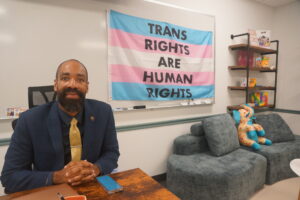
Saturday’s Drag Story Hour is the first of many that will be held in the event space of the new MoCo Pride Center, which opened its first physical location at the end of August.
More space, more programs
The center has offered satellite programs since its founding in 2017. Having a dedicated space has let the event calendar expand “exponentially,” said Maddie Roepe, program director at the new Bethesda location.
“We can’t count on institutions to look out for us or take care of us when things are hard,” she said. “We need a level of support that sometimes our government and our larger cultural institutions are not willing to provide for us. We will provide for each other.”
She said having a physical space will help expand access to support for the queer community. MoCo Pride Center is the first Pride center in Montgomery County.
LGBTQ+ people are at higher risk for mental health challenges and sexually transmitted infections, according to the Centers for Disease Control and Prevention.
They are also more likely to experience housing instability or homelessness, according to a 2020 study from the University of California Los Angeles School of Law.
While the Pride center is a place to foster community, MoCo Pride Center CEO Phillip Alexander Downie said, it’s also a hub that connects people with necessary services, like health care navigation and STI testing.
The center also hosts various peer support groups, including for people who are sober and families of LGBTQ+ people.
There are multiple community spaces in the center, like a coworking room and LGBTQ+ library and archive, open for drop-in use seven days a week.
Downie said services will expand as community needs evolve, with legal and mental health clinics already planned.
He said the physical space will help create “consistent” access to services that make navigating queer life easier.
Without reliable access to educational services, like a Pride center or inclusive school club, young LGBTQ+ people may turn to the internet to learn — which puts them at risk of relying on misinformation, said Erin Gill, a researcher who focuses on education policy’s effect on queer students’ wellbeing.
Pride centers serve the same purpose for communities as gender and sexuality alliances do for students, she said. Having those designated spaces makes it easier for young people to feel a sense of belonging.
Students in schools with inclusive curriculum, gender and sexuality alliances, and culturally informed educators feel safer, more connected to school, face lower rates of bullying and report better mental health than peers in schools without those supports, Gill said.
In communities with Pride centers, Gill said, young people report lower instances of bullying, harassment and violence. They also report better mental health than people in communities who don’t have access to safe spaces.
‘Vital’ to MoCo
As the MoCo Pride Center grows, so will its financial need.
As a nonprofit organization, Downie said all donations and grants given to the center go toward paying staff and funding programs.
He said Montgomery County government is the largest benefactor, having allocated $515,000 to the Pride center this year.
Downie said he hopes as the center grows, county investment will too.
Councilmember Evan Glass, the first openly gay person to serve on Montgomery County Council, said the Pride center is vital to the wellbeing of the county.
Glass is campaigning for the 2026 County Executive election and said he will do everything he can to support and enhance the center in years to come.
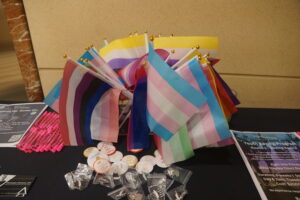
He said it is vital the center has the support it needs to fight against the rhetoric of President Donald Trump’s administration.
“Trump is trying to destroy everything we believe here in Montgomery County. A cornerstone of that is our beautiful diversity in making sure everybody feels safe and welcome,” Glass said. “We need to double down on our commitment to our diversity and the Pride center is a foundation of that.”
Trump has signed multiple executive orders since the start of his second term that scale back protections for LGBTQ+ people, particularly the trans community, by banning transgender people from serving in the military and limiting access to gender affirming care.
‘A game changer’ for queer youth
When looking to the future, Glass said it’s inspiring to reflect on how far support for LGBTQ+ people has come. He said there were no spaces like the Pride center when he was growing up.
Without that solid educational support system, Glass said he didn’t have a place to explore his identity.
“There was no built-in community that I could reach out to. That is what the Pride Center is now — a place for people of all ages to get the help, love and support that they need,” he said. “It would have been a game changer for me, and I hope that it will be a game changer for other young people.”
The MoCo Pride Center is filling a long-neglected gap by bringing services to the LGBTQ+ community.
Wing, a small business owner who asked to only be identified by their chosen first name, was born and raised in the county.
They recently opened their own small business, Wing Desire, which makes sustainable upcycled and vegan art. They set up Saturday a booth at the MoCo Pride Center’s first Wellness Weekend, which is a vendor fair that also connects people with services.
Wing said they first started questioning their sexuality in middle school but didn’t have anywhere to turn to for support.
The Pride center is a resource they wished they could have had growing up, Wing said.
Queer space ’empowers people’
Vettick said it is refreshing to see times grow and change to offer more accessible resources to the queer community.
Growing up in Puerto Rico, she said she was left to her own devices to navigate being queer.
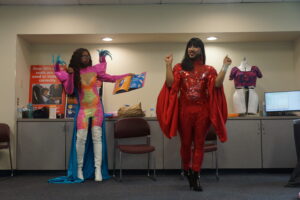
“There was a lot of questions that I had that I was not able to get answers to. Having these kind of queer spaces that are open for everybody with so much resources that are educational, you’re able to get your answers and be represented,” she said. “We didn’t have that back then, and it’s so important right now.”
Vettick encouraged Jazz to pursue their drag dreams, Jazz said.
In a time where queer safe space was hard to come by, the duo created their own.
Jazz said the Pride center will make it easier for future generations to explore their own identifies.
“All of us should have a place where we feel safe, we feel love, and we feel empowered to be ourselves, which is I believe the purpose of life,” Jazz said.
“Creating safe spaces empowers people to live their truly best.”

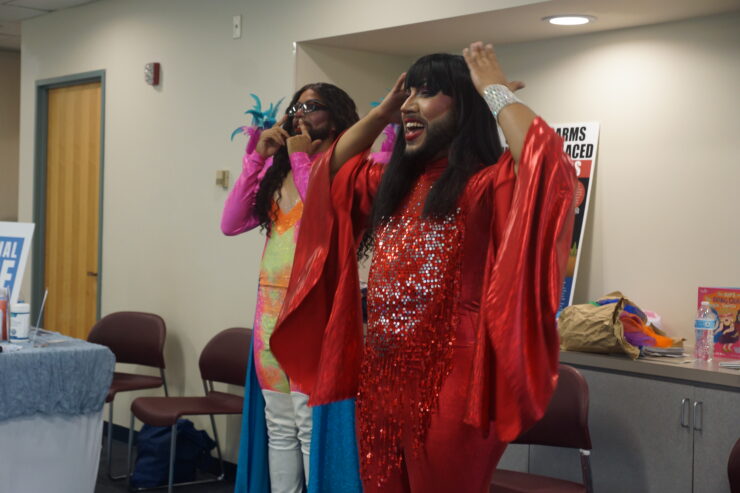
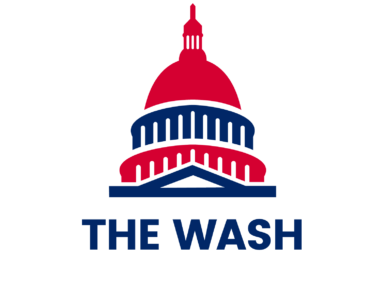












snapped not snaped